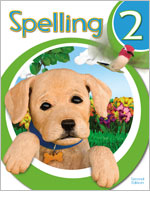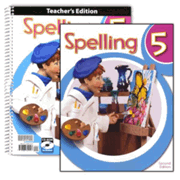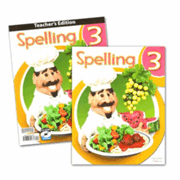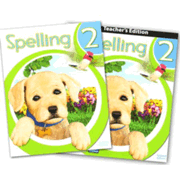BJU Press Spelling courses are available in second editions for grades two through six, while the first-grade course is in its third edition. Student books are colorful and plentifully illustrated.
The series builds upon phonics and structural elements of words in the early grade levels, shifting more toward word origins and history at upper levels. They stress systematic word study skills for effective learning. At all levels, students write spelling words as they are dictated to them, and they also write sentences from dictation.
These courses are very dependent upon interaction between teacher and student. Lessons are taught through activities. Inductive learning methodology helps students discover spelling patterns rather than just reading about them. Lessons teach words in groups reflecting structural patterns and spelling generalizations. One or more “memory words” (sometimes called “sight words”) are generally taught along with each lesson's list of words that follow patterns. Student books include a dictionary that is used for reference as well as for instruction in dictionary skills.
There are both a student workbook and a teacher's edition (TE) for each level. Courses are taught from the TEs, so they are an essential component. In addition to lesson presentation instructions, TEs have reduced pictures of student pages with overprinted answers. Additional resources can be accessed through the BJU Press Homeschool Hub.
The entire series teaches the importance of spelling skills for Christian communication. While there are frequent references to religion within student workbooks, such as sentences about singing in the choir or about salvation, additional connections to a biblical worldview come from material in the TEs.
Lessons require students to think about spelling, word formation, word meanings, and usage. While workbook activities most frequently require students to fill in the blanks, they are presented with quite a bit of variety. Proofreading and composition activities stretch students beyond simple spelling exercises. Games are sometimes used along with hands-on activities.
Pre-tests and final tests, as well as mid-week practice tests, are included. Suggestions are provided for making tests either simpler or more challenging, depending upon the needs of students. There are options for teaching fewer words to students who need a more limited list each week.
The TEs include word lists, spelling generalizations (rules), instructions for giving the different levels of tests, words with context sentences for spelling tests, sentences for dictation, and game suggestions. The Homeschool Hub has lots of extras. While there are four pages per lesson in the student workbook, the printable List Practice and List Review pages add two more pages if you choose to use them. List Practice pages are all somewhat similar as they direct students to identify and write words under the correct group headings for spelling generalizations. List Review pages follow no set format but are mostly fill-in-the-blanks type activities with occasional crossword and word search puzzles; these offer further practice with words from both the current and previous week's lessons. The Hub also has reproducible forms, game and activity suggestions, instructional aids, and other extras.
The first-grade course correlates with BJU Press's Phonics and English 1 and Reading 1, reflecting the sequence of phonics instruction. While it can be used apart from those courses, it is ideally used with them.
In the second grade course, two friends, Robbie and Brianna, are used to create story settings for some writing activities. The third-grade course often ties writing activities to the book's food theme via Daniel and Sophia, eight-year-old twins whose parents own a restaurant. Students might help complete words in a recipe, write a thank-you note, create a menu, or write an Easter card.
In fourth grade, students continue to review phonetic elements while they work on structural analysis, patterns in spelling, and dictionary skills. Occasional composition assignments have them write Bible verses and paragraphs about practical applications of those verses.
In the fifth-grade course, students continue to study structural patterns within words, while also learning about prefixes and suffixes. Two lessons on Latin and Greek word parts are at the end of the book. Occasional composition assignments have them write Bible verses and paragraphs about practical applications of those verses.
In sixth grade, word origins and their relationship to spelling are emphasized as students study words from Greek and Latin roots, prefixes, and suffixes. Composition assignments are similar to those for fourth and fifth grade, but writing prompts are more challenging and will require lengthier responses.
Interactive, proofreading activities in courses for grades two through six help children learn how to spot errors. Some of these activities are usually done orally with a whiteboard (or on paper) and some may be completed by students in the workbooks.
All BJU Press courses have significant Christian content including Scripture verses.

















